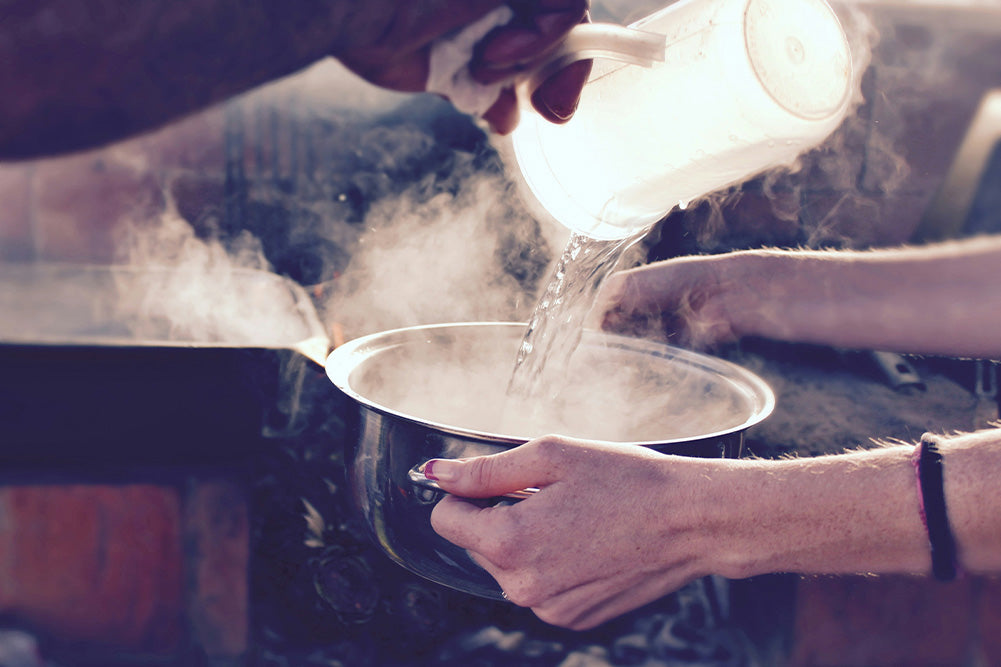Your Cart is Empty
February 08, 2024 3 min read

Lead poisoning recently came back into the limelight as allegations of children getting sick from applesauce have surfaced. With this small but scary health crisis still being investigated, lead finds itself back in the news. Lead may be more common than you think, however, and applesauce is not the leading culprit. Lead has a tendency to sneak its way into your house through the tap.
Lead is a metal found in the earth’s crust. It is toxic to humans and animals alike, and it is likely all around you. Lead can be found in paint from old houses, emitted by motor vehicles, produced by industrial plants, and most commonly in your pipes (1).
Lead does not typically come from the water itself. In fact, lakes, rivers, and other groundwater sources almost never contain lead. According to the CDC, lead pipes, faucets, and other plumbing fixtures all contain lead. Pipes and fixtures labeled as “chrome-plated iron,” “brass,” or “chrome-plated brass” are also soldered with lead, and therefore also put you at risk of lead exposure as the pipes corrode (2). During corrosion, little bits of metal from the pipes begin to dissolve into the water, contaminating it with lead.
Despite passing a series of legislation beginning in the 1980’s that continues to present time, lead contamination is still prevalent in most homes. Even pipes sold as “lead free” may contain up to 0.25% lead (3). Odds are, your tap water is also contaminated with lead.
Lead exposure can occur from touching, inhaling, or swallowing lead, even in small doses. If too much lead enters your body, it can damage the brain, kidneys, and impede red blood cells from carrying oxygen to the body (3).
Lead poisoning affects children and adults differently, but children are at a higher risk for lead poisoning than adults. According to the Environmental Protection Agency, “children exposed to lead can suffer from lowered IQ, damage to the brain and nervous system, learning and behavioral difficulties, [and] slowed growth” (1). Adults can suffer from reproductive issues, hypertension, and nerve disorders as a result of lead poisoning.
Many people believe the lead can be boiled out of water. The myth is not only untrue, but dangerous. Lead cannot ever be boiled out of water. Boiling water contaminated with lead actually concentrates the amount of lead, leaving the water worse off than before (4). Hot or boiled water is more likely to contain lead, so it is recommended to only cook with cold tap water if possible.
The most widely accepted way to remove lead from water is by running your water through an independently-tested water filter (2). These filters will remove lead from any water (excluding salt), allowing you the peace of mind that your water is contaminant-free and safe of lead.
Contrary to popular belief, lead cannot be boiled out of water. Instead, boiled water actually concentrates the lead content, leaving water even less safe than before. In order to safely and effectively remove lead from your water, the CDC recommends using a tested water filter. For a lab-tested filter you can trust, try a Seychelle water pitcher. These pitchers are known to filter out all inorganic contaminants like lead while keeping in healthy minerals. Seychelle will allow you to get the most out of your water, all while getting the lead out of your water.
How do I know if my water contains lead?
Many laboratories will conduct a water test to test your water for lead.
Does boiling water destroy lead?
No. Boiling water will not remove lead from the water. In fact, it is more dangerous to boil water containing lead, as it increases the lead concentration in the water.
What is the best way to remove lead from water?
An independently lab-tested water filter is the best way to remove lead from water.
Can you cook with water that has lead in it?
No. Cooking with water containing lead can put you at risk of lead poisoning.
References